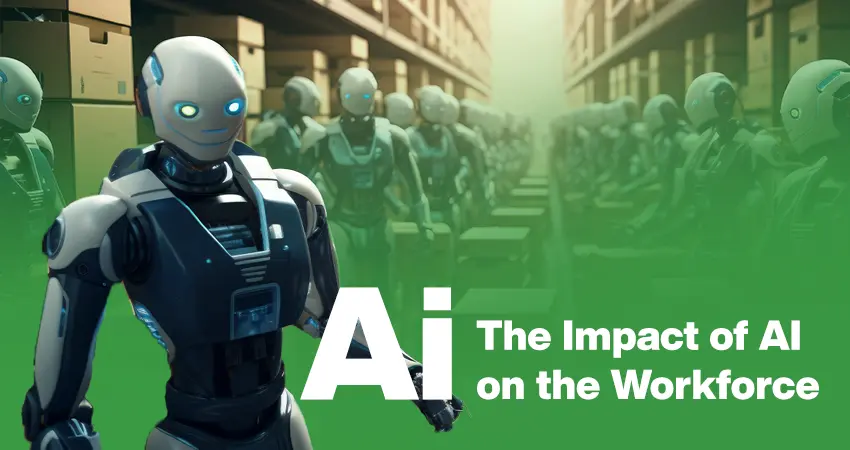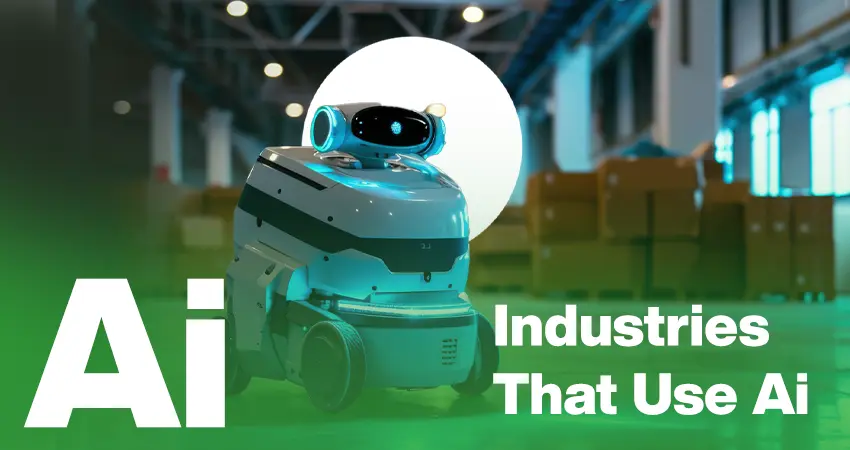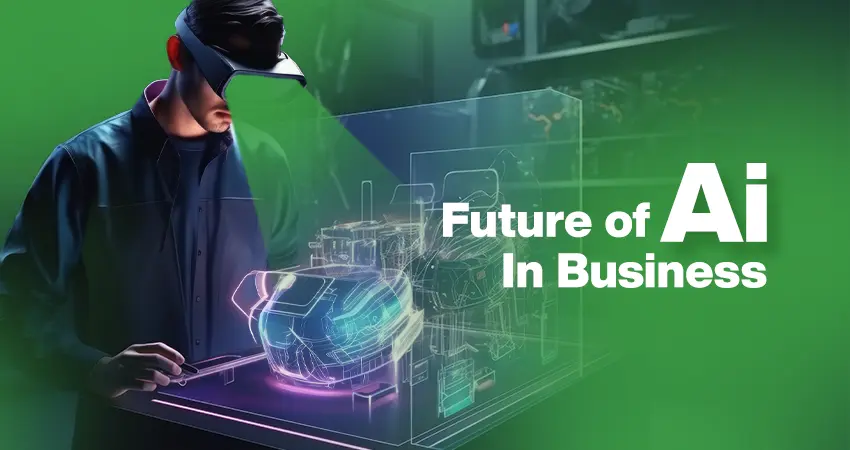How AI is Revolutionizing Business and Innovation?
As technology continues to evolve, Artificial Intelligence (AI) has become way more than just a buzzword. In today’s tough market, using artificial intelligence is like having a secret weapon for many businesses. According to data over 40% of businesses have increased their productivity using AI-driven automation tools. This cutting-edge technology stands at the forefront of technological innovation that helps companies automate repetitive tasks and analyze large amounts of data. In this article, we’ll explore how AI is revolutionizing the methods through which businesses innovate, its impact on innovation, and the future it holds.
How AI is Revolutionizing Business?
We are all well aware of how technology helps us fulfill tasks, and today technology has become so advanced that computers can function like humans and even achieve high success rates. All this became possible due to AI. AI technologies, such as machine learning, natural language processing, and computer vision, improve business processes and decision-making. The use of such AI tools helps optimize business functions, boost employee productivity, and drive business value. From marketing to operations to customer service, the applications of AI are nearly endless. Eager to discover how AI is revolutionizing business? Keep scrolling down.
Improving Customer Service
As technology is at its boom, we are seeing new ways that AI can enhance the customer experience. Most of the time when you visit a website a chatbot always is there to greet you. Similarly, you can embed AI-powered chatbots across channels to instantly streamline the customer service experience. Chatbot technology can also help route customers to a real-life representative who is best equipped to address their questions.
Providing product recommendations
Have you ever noticed that when you revisit the website, it recommends products as per your preferences and choices? That is because of AI-based recommendation engines. It uses artificial intelligence techniques to analyze large amounts of data and make personalized user recommendations. Companies use AI to recommend products that align with customers’s interests and keep them engaged.
Data Analysis and Insights
AI can quickly process large volumes of current and historical data, drawing conclusions, capturing insights, and forecasting future trends or behaviors. These can help businesses facilitate better decision-making about customers, offerings, and directions for future business growth.
Segmenting audiences
Reaching the right audience is one of the crucial tasks in all marketing activities. By analyzing large volumes of user data, AI can identify similarities and patterns to build detailed audience profiles and segments. With this approach, marketers can use AI to increase sales and improve consumer experience. Here are three ways to use AI in digital marketing:
- Use smart segmentation to identify the target audience.
- Establish a relationship with customers on their terms.
- Deliver tailored content to each segment of the target group.
Analyzing customer satisfaction
Customers are the backbone; if you fail to understand them, you can’t go a long way in the business world. Do you know an AI-powered customer service system can detect the emotions of your customers and deliver service that immediately lowers their frustration levels? Emotional AI is the application of artificial intelligence to analyze and interpret human emotions.
It leverages Natural Language Understanding (NLU), a type of artificial intelligence that allows AI-powered chatbots to understand, interpret, and respond to human language contextually. The insights gained from this analysis allow companies to identify opportunities for improvement.
Identifying fraud
Digital transformation has brought a huge number of companies to success. We’ve witnessed significant growth in various sectors over the years. But on the contrary, we can’t overlook the data on fraudulent activities. AI-enabled fraud detection emerges as a crucial tool in the fight against digital fraud. Artificial intelligence in fraud detection means using a group of algorithms that monitor incoming data and stop fraud threats before they materialize.
The Impact of AI on Innovation

In this tech-oriented world, AI is increasingly driving progress in technology and business. You can expect more than you think. Imagine a world where customer service knows your needs before you even ask. Where machines predict problems before they occur and healthcare diagnoses are more accurate or precise than ever.
The Impact of AI on the Workforce
Since AI came into existence, the biggest concern surrounding the rise of AI in business is its potential impact on the workforce. While AI is creating new job opportunities and can automate certain tasks, As we know, AI is efficient in analyzing data and helps to provide insights that can help businesses make better decisions. This can create new job roles for data analysts and scientists.
Industries That Use AI

Artificial intelligence has arrived not only to transform the way people relate to technology but also to business and has been broadly adopted. AI-powered technologies are now an integral part of daily operations in many businesses. Here are the major industries where AI plays a crucial role.
Insurance and finance
The role of artificial intelligence (AI) in the finance and insurance sectors is to detect fraudulent activities and improve financial forecasting accuracy. Large volumes of financial data, policy data, etc. can be analyzed by machine learning algorithms to identify trends and anomalies that may suggest fraudulent behavior. By leveraging machine learning models, financial institutions and insurance companies can detect fraud in real-time, preventing significant losses.
Healthcare
The healthcare industry has done tremendous work while adopting technology, and now artificial intelligence is making its way into healthcare fields. Many applications of artificial intelligence (AI) in healthcare are being utilized to improve clinical decision-making, increase patient outcomes, and maximize operational effectiveness. It has a lot of potential to help improve healthcare in the future.
Industrial and energy sector
It is undeniable that the energy sector has been immensely impacted by AI. Energy conservation, or intelligent power consumption, is considered one of the most relevant applications of AI in the energy sector. Apart from this, AI-driven solutions consider smart grids, fault prediction and prevention, electricity trading, and disaster recovery. At the industrial level, AI is not untouched and plays a crucial role in the manufacturing industry by revolutionizing processes and enhancing efficiency. With the ability to analyze vast amounts of data and recognize patterns, AI helps in optimizing production, predicting maintenance requirements, and reducing downtime.
Education and training
AI has already been creating an impact on education. The aim of using AI in education is to enhance the learning experience, improve the effectiveness of instruction, and provide learners with a more personalized and efficient education. AI systems would easily adapt to each student’s individual learning needs and could target instruction based on their strengths and weaknesses.
Security and surveillance
The role of artificial intelligence (AI) in security and surveillance is significantly gaining momentum, primarily in enhancing the efficacy of diverse security measures. In today’s world, all businesses need to protect their assets, employees, and customers from potential threats. With the advent of artificial intelligence (AI), video surveillance has evolved into a more powerful tool than ever before.
Human Resources
In this highly competitive world, AI has become an essential part of human resource management. By leveraging advanced technologies such as machine learning and natural language processing, organizations can create a more streamlined HR process. Using AI to improve sourcing can greatly enhance an organization’s ability to find the right talent at just the right time. As AI technology continues to grow and develop over time, companies can expect to see more automation, personalization, and data-driven decision-making in human resource management.
The Future of AI In Business

As we have seen AI serving at its best, it is clear that AI will play an even more significant role in business. AI technology is being used across industries to automate processes, improve decision-making, and increase efficiency.
In the coming days, we can expect to see AI being used for more complex tasks, such as creative problem-solving and strategic planning. The technology will focus primarily on improving communication between humans and machines, making interaction more intuitive and natural.
